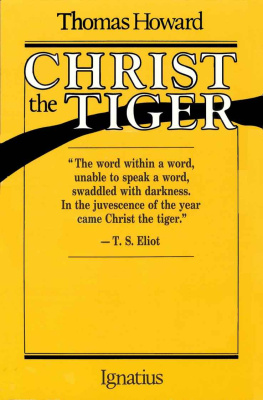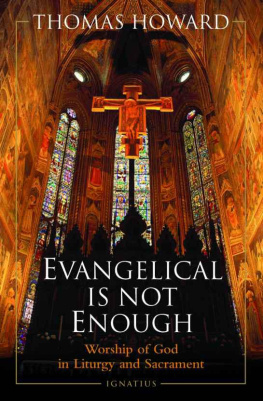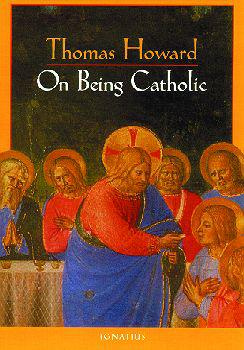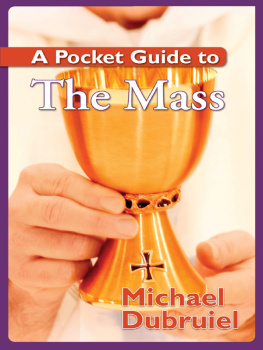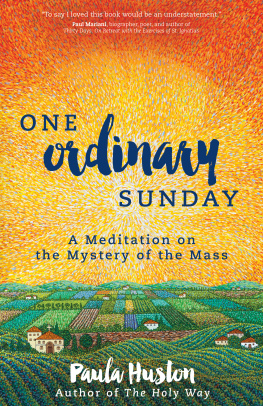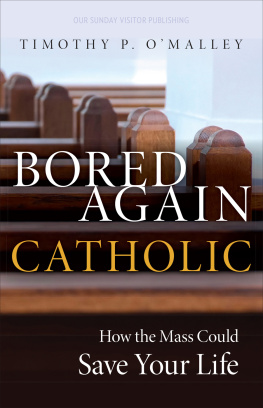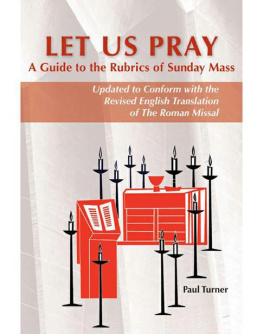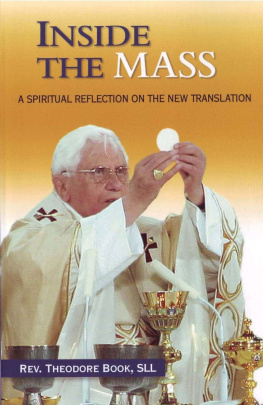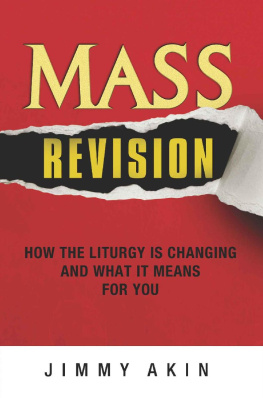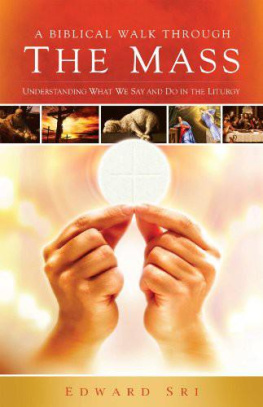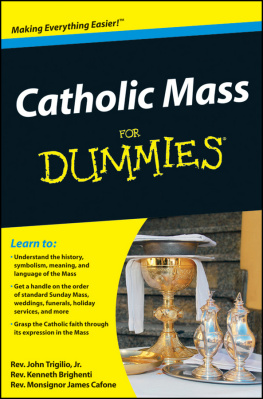Thomas Howard - If Your Mind Wanders at Mass
Here you can read online Thomas Howard - If Your Mind Wanders at Mass full text of the book (entire story) in english for free. Download pdf and epub, get meaning, cover and reviews about this ebook. year: 2001, publisher: Ignatius Press, genre: Religion. Description of the work, (preface) as well as reviews are available. Best literature library LitArk.com created for fans of good reading and offers a wide selection of genres:
Romance novel
Science fiction
Adventure
Detective
Science
History
Home and family
Prose
Art
Politics
Computer
Non-fiction
Religion
Business
Children
Humor
Choose a favorite category and find really read worthwhile books. Enjoy immersion in the world of imagination, feel the emotions of the characters or learn something new for yourself, make an fascinating discovery.
- Book:If Your Mind Wanders at Mass
- Author:
- Publisher:Ignatius Press
- Genre:
- Year:2001
- Rating:3 / 5
- Favourites:Add to favourites
- Your mark:
- 60
- 1
- 2
- 3
- 4
- 5
If Your Mind Wanders at Mass: summary, description and annotation
We offer to read an annotation, description, summary or preface (depends on what the author of the book "If Your Mind Wanders at Mass" wrote himself). If you haven't found the necessary information about the book — write in the comments, we will try to find it.
If Your Mind Wanders at Mass — read online for free the complete book (whole text) full work
Below is the text of the book, divided by pages. System saving the place of the last page read, allows you to conveniently read the book "If Your Mind Wanders at Mass" online for free, without having to search again every time where you left off. Put a bookmark, and you can go to the page where you finished reading at any time.
Font size:
Interval:
Bookmark:
Wanders at Mass
IGNATIUS PRESS SAN FRANCISCO
Original edition published by Franciscan University Press,
Steubenville, Ohio 43952
1995, Thomas Howard
All rights reserved
New edition printed by permission
Unless otherwise noted, the Scripture quotations are from the Revised Standard Version, Catholic Edition
1946, 1952, 1965, and 1966 by the Division of Christian Education, National Council of the Churches of Christ in the U.S.A.
Cover Art: Prayer in the Garden of Gethsemane (detail)
Fra Angelico
Museo San Marco, Florence, Italy Scala / Art Resource, New York
Cover design by Roxanne Mei Lum
New edition published in 2001 by Ignatius Press, San Francisco
2000, Thomas Howard
All rights reserved
ISBN 978-0-89870-761-8
Library of Congress control number 99-73021
Printed in the United States of America
Part One
What Is the Mass?
Part Two
The Order of the Mass
Entrance Song
Greeting
Penitential Rite
Kyrie
Gloria
Opening Prayer
Thanks Be to God
Responsorial Psalm
Gospel
Homily
Creed
General Intercessions
Preface
Canon of the Mass
Consecration
Memorial Acclamation
The Great Amen
Lords Prayer
Sign of Peace
Breaking of the Bread
Communion
The Mass is the central act of Christian worship and has been so from the beginning. The earliest documents of the Church, written during the years just after the apostles died, record for us some of the very prayers that were then used at the eucharistic celebration when the believers gathered for worship.
It is worth noting that these people, most of whom were accustomed to synagogue worship, with its set readings and prayers, approached their newfound faith, with its startlingly new content (Jesus is our Messiah; he is ImmanuelGod with usand was born of the Virgin Mary, died and rose for us, ascended into heaven, and will come again), with great ardor and devotion, and yet with the solemnity to which they were accustomed from their old forms of worship, and which befitted the immense mysteries that had come upon them in the events of the Gospel.
I say and yet, implying a possible disjuncture between the ardor and devotion on the one hand and the solemnity on the other. It is often supposed that genuine ardor calls for spontaneity: that is, if we are wholehearted and fervent about something, the best way to register this is by giving voice, quite spontaneously, to whatever our heart feels at the moment. A lover, for example, will want to address his beloved with the unplanned immediacy that surges up from his heart and that tells her that what he is saying is indeed from his heart. By the same token, a Christian worshipper will want to give tongue to his own personal and genuine feelings of the moment when he speaks to the Savior in worship. Spontaneity would seem to be the very pledge and guarantor of authenticity here. Anything precast or rigidly structured would seem to imprison in a cage what ought to be free-flying, like a lark.
Indeed, this is all quite true. Spontaneity, not infrequently, gilds our most significant moments with its delightful guarantee of authenticity. What mother or father, for example, is not touched to the quick by the nosegay of limp dandelions, picked and proffered from the grimy little fist of their child. No bouquet arranged by the most celebrated floral artist can compete in these sweepstakes.
And yet this is not the whole story. It is an oddity about us mortals that when we come to the most profound experiences of our lives we become aware of the pale inadequacy of our own ability to respond with anything like an appropriately weighty response and find that we have to reach for something precast and structured.
For example: when a birth occurs. There is all the flurry of passing the word about and congratulating the parents and exclaiming over the happy event. But somehow we find that we want to do more. And so we all turn to that great treasure trove stored up by every tribe and culture and society, namely, tradition. Whether we are Watusi or Saxons or Jews or Celts, our traditions will offer to us some time-tested, public manner of giving shape to the event. For us in the West it may be the popping of champagne corks or the passing out of cigars. Certainly there will be cards, and flowers, and giftswith pink or blue in evidence, according to whether the newborn is a girl or a boy. So dictates our tradition.
And no one supposes that because I offer a blue blanket for the bassinet of the new man-child my sentiments are other than heartfelt and fervent, even though I have been unabashedly un original in choosing blue. Blue is for boys: there it is. Tradition. The precast. The structured. But nevertheless genuine.
Or marriage. Sometimes a young couple, in an effort to achieve a patina of authenticity about their marriage, will cobble up their own vows and invent little ceremonies that spring from their own private experience of having come to love each other. Such efforts can, at times, succeed, up to a point, and we, the well-wishers, may find ourselves touched.
But as often as not we are all plunged into embarrassment. We feel that we, the congregated friends, have been brought in to precincts where we have no business, as the couple gaze at each other, perhaps sing to each other in lyrics and tunes composed by one or the other of them, and exchange vows which, in an effort at truthfulness, blunder across the threshold that lies between the private and the public, forcing us all into the greatest possible anguish and discomfort.
And once again all tribes and cultures seem to have known instinctively that for the public marking of lifes most profound events (birth, marriage, and death) we need something greater and sturdier than what our private attempts of the moment can gain. Whether it is ritual dances (with the very steps strictly choreographed by tradition), processions, ornate costumes, or ordeals, we find these events decked elaboratelyand rigidly. In the West again, we dress the bride in white, with pearls, flowers, and a veil (this last has unhappily come upon great uncertainty, with the near disappearance of the notion of bride-as-virgin), and the groom in black and starched white. Slow, artificial stepping down the aisle. Attendants, also in elaborate costume, for the bride and groom. Dearly beloved... intoned by the minister. All very formal.
And all, somehow, exactly apt. For this is not just John and Mary deciding to take up residence together because they find each other attractive and congenial. It is the mystery of masculinity, this time embodied and enacted by John here, and the great mystery of femininity, here borne by Mary, coming together as man and woman have come together since Eden. Immemorial dignity crowns this man and this woman at this moment. The very mystery of our humanity itself, under its two modalities of masculine and feminine, arches in titanic splendor over their heads.
How shall we bespeak such immensities? My sentiments and yours are pitifully inadequate. We need the tradition springing from the ancient wellsprings of the race to come to our assistance and furnish us with words and movements that will give adequate shape to what it all means.
Likewise with death. This is merely a biological event (like birth and marriage). But we all know that biology is simply the tiny tip, under the species of mortal flesh, of the infinitely deep mystery of personhood. So when a human body ceases to breathe and live, we cannot leave the matter with simply disposing of the awkward residue. Nothing will do but ritual and ceremony, that is, words and movements, which, by virtue of themselves springing from the heart of the race, as it were, and of having been tested and dignified by ancient usage, have taken on the weight and solemnity that answer to the occasion, as opposed to our own helter-skelter attempts to respond to what has happened.
Font size:
Interval:
Bookmark:
Similar books «If Your Mind Wanders at Mass»
Look at similar books to If Your Mind Wanders at Mass. We have selected literature similar in name and meaning in the hope of providing readers with more options to find new, interesting, not yet read works.
Discussion, reviews of the book If Your Mind Wanders at Mass and just readers' own opinions. Leave your comments, write what you think about the work, its meaning or the main characters. Specify what exactly you liked and what you didn't like, and why you think so.



